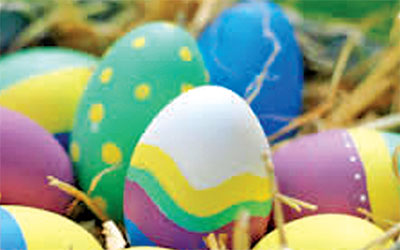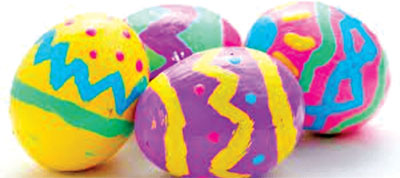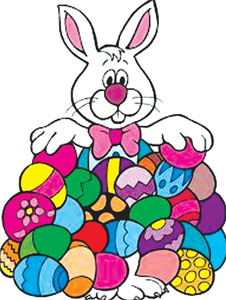Today is Easter Sunday
Those who follow the Julian calendar will celebrate Orthodox Easter
on April 20 (the dates of the two holidays usually differ, with Orthodox
Easter being celebrated later).
 The date of Easter changes because of the moon. Each year, Easter is
celebrated on the first Sunday after the full moon following the vernal
equinox. This year, the first vernal equinox wasn't until March 20,
which is why Easter will take place in late April. Easter is also
arguably the most important holiday in Roman Catholicism. It marks the
end of Lent -- when fasting occurs for 40 days and nights - and
celebrates the resurrection of Christ. Good Friday is honoured in
remembrance of his crucifixion. The date of Easter changes because of the moon. Each year, Easter is
celebrated on the first Sunday after the full moon following the vernal
equinox. This year, the first vernal equinox wasn't until March 20,
which is why Easter will take place in late April. Easter is also
arguably the most important holiday in Roman Catholicism. It marks the
end of Lent -- when fasting occurs for 40 days and nights - and
celebrates the resurrection of Christ. Good Friday is honoured in
remembrance of his crucifixion.
Over the years , Easter has adopted some pagan traditions. It's
rumoured that the holiday took its name from Eostre, a Teutonic goddess
of spring and fertility, or hebdomada calba, which means white week in
Latin. Commercialism has also slipped its way into the Easter
celebration. The spring holiday is widely associated with coloured eggs,
chocolate bunnies and marshmallow chicks. It's standard for children to
celebrate the holiday by getting Easter baskets, searching for hidden
eggs and wearing pastel colours and bonnets. The mythical Easter bunny
brings baskets to children and hides the eggs, which kids search for on
Easter Sunday morning.
'Easter eggs', also called 'Paschal eggs', are special eggs that are
often given to celebrate Easter or springtime. As such, Easter eggs are
common during the season of Eastertide.
The oldest tradition is to use dyed and painted chicken eggs, but a
modern custom is to substitute chocolate eggs, or plastic eggs filled
with confectionery such as jelly beans. Eggs, in general, were a
traditional symbol of fertility, and rebirth. In Christianity for the
celebration of Eastertide, Easter eggs symbolise the empty tomb of Jesus
though an egg appears to be like the stone of a tomb.
A bird hatches from it with life; similarly, the Easter egg, for
Christians is a reminder that Jesus rose from the dead.

The practice of decorating the eggshell is ancient, pre-dating
Christian traditions. Ostrich eggs with engraved decoration that are
60,000 years old have been found in Africa. Decorated ostrich eggs, and
representations of ostrich eggs in gold and silver, were commonly placed
in graves of the ancient Sumerians and Egyptians as early as 5,000 years
ago. The custom of the Easter egg, however, originated in the early
Christians Mesopotamia who stained eggs red in memory of the blood of
Jesus.
Blessing of Easter food in Poland
The Easter egg tradition may also have merged into the celebration of
the end of the privations of Lent in the West. Historically, it was
traditional to use up all of the household's eggs before Lent began.
Eggs were originally forbidden during Lent as well as on other
traditional fast days in Western Christianity (this tradition still
continues among the Eastern Christian churches.)
Likewise, meat, eggs and dairy are prohibited during the Lenten fast.
This established the tradition of Pancake Day being celebrated on Shrove
Tuesday.
This day, the Tuesday before Ash Wednesday when Lent begins, is also
known as Mardi Gras. Mardi Gras is a French phrase which translates as
"Fat Tuesday" to mark the last consumption of eggs and dairy before Lent
begins.
During Lent, since chickens would not stop producing eggs during this
time,a larger than usual store might be available at the end of the fast
if the eggs had not been allowed to hatch.
The surplus, if any, had to be eaten quickly to prevent spoiling.
Then, with the coming of Easter, Pascha Easter and the eating of eggs
resumes.
One would have been forced to hard boil the eggs. Boiled egg that the
chickens produced so as not to waste food, and for this reason the
Spanish traditionally eaten on and around Easter) contains hard-boiled
eggs as a primary ingredient. In Hungary eggs are used sliced in potato
casseroles around the Easter period.
Decoration and symbolism
Easter eggs from the Czech Republic are decorated with straw.
 In the Orthodox and Eastern Catholic Churches, Easter eggs are dyed
red to represent the blood of Christ shed on the Cross, and the hard
shell of the egg symbolised the sealed Tomb of Christ the cracking of
which symbolised his resurrection from the dead. Easter eggs are blessed
by the priest at the end of the Paschal Vigil wich is equivalent to Holy
Saturday and distributed to the faithful. In the Orthodox and Eastern Catholic Churches, Easter eggs are dyed
red to represent the blood of Christ shed on the Cross, and the hard
shell of the egg symbolised the sealed Tomb of Christ the cracking of
which symbolised his resurrection from the dead. Easter eggs are blessed
by the priest at the end of the Paschal Vigil wich is equivalent to Holy
Saturday and distributed to the faithful.
The egg is seen by followers of Christianity as a symbol of
resurrection while being dormant it contains a new life sealed within
it. Blessing of decorative baskets with a sampling of Easter eggs and
other symbolic foods, is one of the most enduring and beloved Polish
traditions on Holy Saturday.
There are many other decorating techniques and numerous traditions of
giving them as a token of friendship, love or good wishes. A tradition
exists in some parts of the United Kingdom of rolling painted eggs down
steep hills on Easter Sunday. In the U.S., such an Easter egg roll is
often done on flat ground, pushed along with a spoon .

The Easter Egg Roll has become a much-loved annual event on the White
House lawn. An Easter egg hunt is a common festive activity, where eggs
are hidden outdoors (or indoors if in bad weather) for children to run
around and find.
This may also be a contest to see who can collect the most eggs.
When boiling eggs for Easter, a popular tan colour can be achieved by
boiling the eggs with onion skins. A greater variety of colour was often
provided by tying on the onion skin with different coloured woollen
yarn.
In the North of England these are called pace-eggs or paste-eggs,
from a dialectal form of Middle English 'pasche'. They were usually
eaten after an egg-jarping (egg tapping )competition. Natural colours
are obtained by using various plants.
- Internet |

